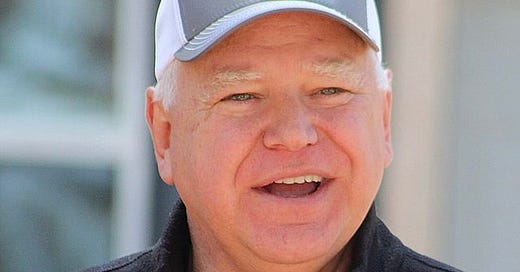The Quiet Radicalism of Tim Walz’s BIG DAD ENERGY
Also, when will we be ready for BIG MOM ENERGY?
Hello new subscribers! Many of you have joined me by way of my interview in Culture Study in which I talked about my new book “When You Care.” I’m so excited to expand the narrative on parenting and caregiving alongside you. Please message me, comment, and, whenever it makes sense, share. Let’s widen the aperture on care together!
Tim Walz is officially much of America’s new favorite dad. His likability and his dadness are, according to the Walz-mania coverage in traditional and social media, of one piece.
But of course dadness isn’t a fixed thing. Fatherhood, like motherhood, is a construct that changes over time.
There is no doubt that some of Walz’s appeal comes from a blend of nostalgia and longing, all easily meme-ified. He is seen as handy, outdoorsy, and a provider of as many big hugs as you need. The kind of guy who always picks you up at the airport, and is never late. He is, in the public imagination, and in the plainest and yet most meaningful way, present. Solid. Someone you count on.
But underneath this likable sitcom dad veneer sits a subtle yet significant shift in our conceptions of fatherhood and what it means to be a man overall. Walz is not a mid-century, benevolent, commander-in-chief, “fathers know best” type, nor is he one of those charming doofus dads who came later — well-meaning, but incompetent. Instead, he is a dad who has clearly spent time in the depths of caregiving, who understands the practical and emotional pressures of parenthood and tending to the young in general, and has been shaped, politically and personally, by those experiences.
What’s radical about this moment with Walz isn't’ just that we have been presented with someone who reminds us of our daddy, or the dad we wish we had, and it feels so good. (A sharp contrast to the “daddy issues” alternative.) The big deal here is that Walz is transparently and substantially integrating his care self into his public persona, allowing us to see how the parenting side of him and the leadership side of him aren’t a threat to one another. Instead, they enrich one another. We see this in his policy record, in which his vision of family values isn’t rooted in nostalgia, or the patriarchy, but instead supporting parents and caregivers to both care for, and plan, the families they have.
As Grace Seger reported in the New Republic:
“He and the Democratic-controlled state legislature undertook an ambitious agenda in 2023, approving a slew of progressive policies including an expanded state child tax credit, a new paid family and medical leave program, universal school meals, and additional protections for abortion access. Despite their razor-thin majority, state Democrats embraced those ideas, which would be considered moon shots in a divided legislature.”
We also see this in the way he talks about care. Speaking of the time he went through infertility treatments, Walz said “I remember praying every night for a call for good news, the pit in my stomach when the phone rang, and the agony when we heard that the treatments hadn’t worked.” This wasn’t just his wife’s emotional journey — it was his, too. As someone who went through infertility treatment, I promise you that the fact that he was experiencing such a high level of emotional intensity made the experience all the easier for his wife. Invisible parental labor begins long before birth and sometimes long before conception; infertility was not his wife’s emotional burden to carry on her own.
More Walz observations: He credits his daughter with influencing his efforts to stop gun violence. And speaks tenderly about his son’s learning disorder and neurodivergence. In all his references to his children, one gets the sense that his relational self forms his ethical self, and vice versa. His care relationships color, in the best possible way, his understanding of the world. He sees the connection between his longing for a good life for his vulnerable, particular children, and his longing for a good life for everyone else’s children.
As wonderful as this is, the fact that I haven’t seen a woman pull this off successfully is definitely a bummer. I really would have liked to see a woman break this particular glass ceiling. Alas, “Big Mom Energy” in politics remains a work-in-progress, though some elected officials, like the U.S. Rep. Katie Porter, are successfully moving the needle. Unfortunately, too much association with caregiving still seems to make women appear as biased, soft, myopic, or unserious. We’ve accepted Momala. But I am not sure we, as a society, are ready yet for Mom.
I hope Walz gets us closer to seeing how our caregiving, private sides, and our leadership, public sides shouldn’t be separate at all. How, in fact, these tender, intimate relationships in which we care for another can feed and nourish our capacity to protect and care for all. Not inevitable, but definitely possible. I hope that the next time I see someone manage this integration of parenthood and politics so well it is a woman, and her parent vibes and fitness for leadership blend as seamlessly in our collective imagination as they do for Walz. Because BIG CARE ENERGY will always have my vote.





This is a wonderful article about Walz. And there's so much more to be said about how (virtually impossible) it is for women to achieve that same integration of self, isn't there... I'd like to read that :)